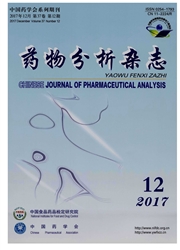

 中文摘要:
中文摘要:
目的:N3-邻甲苯甲酰基-氟尿嘧啶(N3-o-toluyl-fluorouracil,TFU)是N1-乙酰基、N3-邻甲苯甲酰基-氟脲嘧啶(ATFU,阿托氟啶)降解的次级化合物和5-氟脲嘧啶(5-fluorouracil,5-FU)的前体化合物。本研究观察了TFU对S180小鼠肉瘤的生长抑制作用,利用高效液相色谱(HPLC)法对TFU的代谢进行了检测。方法:以昆明系小鼠腋部皮下接种S180小鼠肉瘤细胞株,接种后的小鼠以不同剂量TFU每天灌胃,连续10~14d。末次给药48h后,处死动物,用本研究所建立的HPLC方法对TFU的代谢进行了检测,测定了血浆和不同组织(肝、肺、瘤)中TFU和5-FU的浓度。结果:分别以50,100和200mg.kg-1剂量的TFU,对小鼠连续灌胃10~14d后,TFU对S180小鼠肉瘤的抑制作用分别达到38.99%,51.83%和60.68%,肿瘤细胞生长表现为剂量依赖性。HPLC法检测结果显示,末次给药48h后,在肝中仍可检测到较高浓度的5-FU,这说明TFU主要蓄积在肝中,在酶的作用下缓慢代谢。其次分布在瘤组织中,在肺组织和血浆中的浓度最低。结果显示TFU的代谢产物可以优先作用于肿瘤细胞,其代谢产物5-FU的分布特点也说明了TFU较高的抗肿瘤活性和较低的机体损害。结论:研究结果显示TFU是5-FU前体药物中具有进一步研究价值的抗癌药物。
 英文摘要:
英文摘要:
Objective:N3-o-toluyl-fluorouracil(TFU)is the derivative of N1-acetyl-N3-o-toluyl-fluorouracil(atofluding),and the prodrug of 5-FU.Herein,we examined the growth inhibition of TFU on sarcoma S180 in mice and then the biotransformation of TFU was analyzed by using high-performance liquid chromatography(HPLC).Methods:The S180 sarcoma cells with ascites were harvested,and inoculated subcutaneously into the right armpit region of Kunming mice.The effects of TFU on sarcoma S180 in mice were examined after 10 to 14 days oral administration.In study of biotransformation of TFU,the measurement methods of TFU and 5-FU were established using HPLC analysis.The levels of TFU and 5-FU in plasma and various tissues including liver,lung and sarcoma were determined after 48 h of oral administration with TFU.Results:TFU delayed the growth of carcinoma S180 in mice by 38.99%,51.83% and 60.68% after 10-14 days of oral administration with 50,100 and 200 mg·kg-1.The tumour growth inhibition was dose-dependent.HPLC results showed that high levels of 5-FU were still in liver 48 h after the end of oral administration,implying that TFU preferentially accumulated in liver with slow conversion to 5-FU by enzymes.Further,a high level of 5-FU was found in tumors with a relatively low level in lungs and plasma.These results suggest that the metabolite of TFU was preferentially converted or taken up by tumor cells.The distributions of 5-FU may contribute to its high anti-tumor activity and low adverse reactions in vivo.Conclusion:These results demonstrate that TFU may be a promising pro-drug of 5-FU for cancer treatments.
 同期刊论文项目
同期刊论文项目
 同项目期刊论文
同项目期刊论文
 期刊信息
期刊信息
